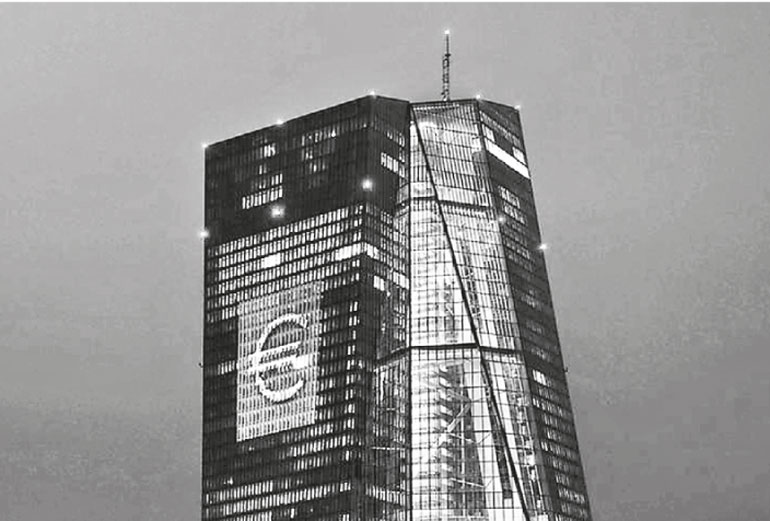Thursday Feb 19, 2026
Thursday Feb 19, 2026
Saturday, 10 December 2016 01:05 - - {{hitsCtrl.values.hits}}
Reuters: The European Central Bank will extend its already generous asset buys on Thursday, aiming to boost stubbornly weak inflation, but with much of its firepower exhausted it may also debate sending a token signal about the eventual end of such purchases.
Emphasising abundant risk, including from elections in potentially four of the euro zone’s five biggest economies, ECB President Mario Draghi is expected to argue that premature tapering – or slowly ending – bond-buying could abort a still timid recovery, unravelling the impact of the purchases.
“Draghi’s challenge at today’s Council meeting is to broker a deal whereby he doesn’t disappoint market expectations of an extension of the current asset-purchase programme, while satisfying the demands of the more hawkish elements,” said Kit Juckes, a strategist at Societe Generale.
 The headquarters of the European Central Bank (ECB) are illuminated with a giant euro sign at the start of the ''Luminale, light and building'' event in Frankfurt, Germany – EUTERS
The headquarters of the European Central Bank (ECB) are illuminated with a giant euro sign at the start of the ''Luminale, light and building'' event in Frankfurt, Germany – EUTERS
The ECB has already spent 1.4 trillion euros ($1.5 trillion) buying bonds and has been at pains in the past month to emphasise that maintaining easy financing conditions is ‘crucial’ as underlying inflation seems to be stuck below 1%.
This message was taken by markets as confirmation of their expectation for a six-month extension of asset buys until September.
The ECB will announce its key policy decisions at 1245 GMT, followed by Draghi’s news conference at 1330 GMT.
On the face of it, the outlook is upbeat. Inflation – which has been dangerously low – is now at its highest in more than two years and rising. Higher oil prices and predictions for more U.S. budget spending are bolstering expectations. Euro zone economic growth is shrugging off Britain’s decision to leave the European Union, and Germany, the bloc’s growth engine, seems to be picking up speed again. Ironically, the collapse of Italy’s government this week may actually hasten instead of delay the recapitalisation of ailing lender Monte dei Paschi, much to the ECB’s relief. It has pointed to weak banks as a key obstacle to transmitting stimulus.
Italian bank shares are up over 10% this week, and the yield differentials between the sovereign bonds of Germany and peripheral countries like Italy and Spain have narrowed since Sunday’s vote.
The euro hovered near a three-week high versus the dollar on Thursday and European shares rose for a fourth straight day.
Weak outlook
But beneath the surface, the outlook is far from comforting.
The inflation rise is almost entirely due to past declines in oil price being knocked out of statistics. Underlying inflation is flat, if not slowing, suggesting that price growth is far from sustainable, a key condition for removing stimulus.
Wage growth has also disappointed, suggesting that companies have cut their inflation expectations. This is a hard-to-break cycle that could entrench anaemic price growth, making it harder to get it back to the desired at-or-just-below 2%.
Even consumption, the key driver of growth is not as good as it looks. Consumption has been driven a jump in disposable income due to oil price falls and loose ECB policy. But Brent crude is up 14% in the past three months, leaving monetary policy as the chief driver of consumption.
“Core inflation and wage growth remain stubbornly low, and the ECB will be wary of repeating past mistakes of withdrawing support too early,” HSBC said in a note to clients. “Perhaps as important are the numerous political risks.”
The rising clout of populist parties could also weaken governments’ resolve to push ahead with painful but needed reforms. Elections in France, Germany, the Netherlands and possibly Italy could leave the ECB with more of the burden.
Even though many of the ECB’s fresh economic forecasts will be broadly unchanged from three months ago, the projection for underlying inflation is likely to be cut, a sign that the rise in inflation may be temporary.
One key problem for the ECB to solve is how to find enough assets to buy. Its self-imposed rules are creating a scarcity, and the ECB will have to ease some restrictions, though each move will come at a cost, raising political and legal challenges.